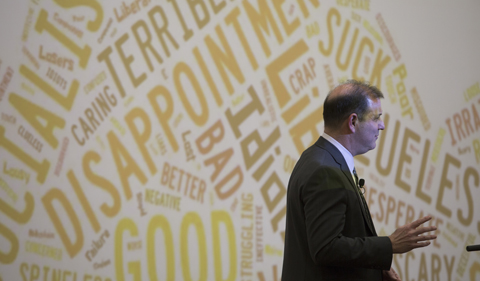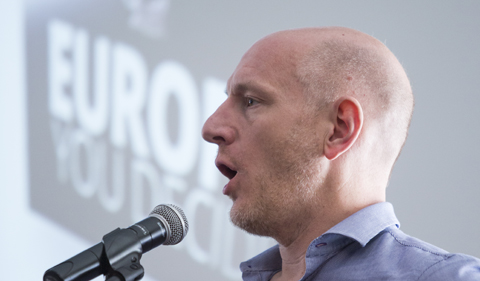The 2018 Baker Peace Conference dealt with the subject of modern populism and how the media, academics, and other analysts have interpreted its role in the U.S. election of 2016 and world politics in general.
Keynote speaker Ken P. Stern discussed his book Republican Like Me: How I Left the Liberal Bubble and Learned to Love the Right, which chronicles his interactions with Americans who live in politically conservative states – a world not so far away geographically but culturally distant from his own in a progressive neighborhood in Washington, D.C.
Stern argued in his talk that Americans of different political persuasions need to have more meaningful interactions with each other if the country is to move beyond its partisan gridlock.
The conference, co-sponsored by the Baker Peace Studies Program and the Contemporary History Institute, featured a keynote speech by Stern on March 22, followed by three panels on March 23. Conference presenters included historians, journalists, political scientists, and media scholars.
Stern, former CEO of National Public Radio and currently president of Palisades Media Ventures, gave a broadly framed keynote lecture for an audience of students, staff, faculty, community members, several trustees of Ohio University, and President M. Duane Nellis and First Lady Ruthie Nellis on Thursday evening.
Friday’s panels focused more immediately on the election of 2016 and the U.S. media’s reactions to President Donald Trump’s candidacy, as well as the resurgence of populism worldwide.
The first panel, “The National News Media During the Presidential Election of 2016,” and moderated by Dr. Pamela Walck of Duquesne University (who earned a Ph.D. in Journalism at Ohio University), featured history professor Richard John (Columbia University) and communications professor Laeeq Khan (Ohio University), as well as Washington Post White House correspondent Jenna Johnson, who all provided both broader context and personal experiences in covering and analyzing the 2016 election. The panel focused on the national media’s coverage of the election and the challenges of covering a candidate like Trump.
The second panel, “The Regional News Media During the Presidential Election of 2016,” moderated by Will Drabold of Mic.com (and a graduate of Ohio’s Honors Tutorial College), debated how Ohio news outlets covered Trump’s rise and the state’s pivotal role in American political life. Dr. Thomas Suddes, assistant professor of journalism at Ohio University, talked about his experiences covering Ohio politics for various publications and the election’s meaning for the state in general. Trista Thurston, an Ohio University graduate (Scripps), now with the Observer-Reporter in Greene County, Pa., discussed her work covering the election for the Lancaster Eagle Gazette, in an area which voted heavily for Trump. Howard Wilkinson, a veteran journalist in the Cincinnati area (now with the PBS affiliate WVXU and previously at the Cincinnati Enquirer), analyzed the urban-rural divide in the state and how certain characteristics of that divide contribute to Ohio’s reputation as a somewhat unpredictable swing state.
The third and final panel, “The Worldwide Resurgence of Populism,” and was moderated by Dr. Brad Eidahl of Central Michigan University (a recent History Ph.D. from Ohio University). Professor Maya Arakon of Denison University, herself forced into exile by the regime in Turkey, led off the panel with a analysis of Recep Tayyip Erdogan’s authoritarian government and how it generates support for its ultra-nationalist policies. Dr. Martin Farr of Newcastle University continued the discussion about populism with a study of the U.K.’s Brexit decision and the urban/rural divide in British society. And, to conclude the panel and the conference, Dr. Leon Aron of the American Enterprise Institute provided insight into the authoritarian and populist nature of Vladimir Putin’s regime in Russia and its relationship with the West.
The 2018 Baker Peace Conference was a resounding success and provided students and other attendees with a riveting conversation about populism at home and abroad and the media’s role in covering such a phenomenon. The presenters all fielded interesting questions from audience members and responded with insightful commentary, enhancing what is already a fascinating and sometimes provocative subject.























Comments